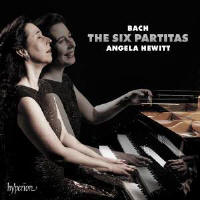Texte paru dans: / Appeared in: |
|
|
Reviewer: David
Reznick
We know very little about Bach
the man, because he did not travel much—in fact, he never left the borders
of modern-day Germany. But within his self-imposed boundaries he revealed
himself as a dynamo of work, the paterfamilias of an enormous and
influential family, a deeply spiritual Christian, and a person who was
always ready for a fight. All in all, he probably didn’t get all that many
invitations to go out for a beer. But we know a great deal about his music,
and therefore it is fairly easy to imagine him alone at the keyboard,
sifting through ideas that no one else had ever experienced, and extracting
a steady bounty of gold nuggets. Where he got these ideas was a mystery, but
since he spoke the musical language of the people, he was able to translate
them for his listeners so they could at least feel the power and the truth
that he expressed. Soli Deo Gloria, he wrote on his manuscripts, and he
meant it.
I always imagine Bach not as
the choir director or the composer of oratorios and cantatas, but alone in a
room with some keyboard instrument or other, bringing forth music meant to
be shared only with the person who was destined to perform it. And it’s easy
to slip someone like Glenn Gould into the “performing” person; as a man
quite in control of his image, he was able to project a person who lived
only to plumb the depths of Bach. But of course, just about anyone who is
talented enough to get a recording contract is likely to give this music a
try. There are many, many recordings of the Bach Partitas, and in each case,
the pianist or harpsichordist becomes the co-composer, because musical
notation had not yet been codified to the degree that it was possible for
the original composer to transmit his wishes to the performing artist. So
it’s likely that every recording of the Partitas provides a different
aspect, one that we hadn’t thought of before. Therefore, it almost seems unfair to recommend a single choice of CD to acquire. For those of us who came to know this music played on the harpsichord, it’s very difficult not to feel that this is the only “correct” way. But virtually all the recordings now are for piano; and that provides the musician with so many choices that one’s thoughts keep going back to the difference between the two instruments, rather than concentrating on the music itself. How would Bach have worked if he were using a piano? Well, the “harpsichord” contingent is convinced that only in this way can the music be experienced; but you can’t deny that the piano accords more nuances to allow the composer to express his emotions. At any rate, I’m close to proclaiming that this new Hyperion disc featuring pianist Angela Hewitt is the one to have, especially if you’re only having one. Her approach to this music is simply ideal: As she goes forward translating harpsichord into piano, we are always aware of the choices she is making, especially those of dynamics and rubato; but at the same time she is able to allow herself to be swept away by the beauty and power intrinsic in the music, no matter which instrument is used to transmit it. This can only come from a lifetime of devoting herself to study of these works over years and years, without ever losing the delight she takes in playing and listening to them. And the more you listen to her CD (I listened to it three times over the weekend), the more you want to hear competing versions to see what others do with the same material; and this is good for the listener and the recording industry as well.
| |
|
|
|
|
|
|
|
Cliquez l'un ou l'autre
bouton pour découvrir bien d'autres critiques de CD |
|




